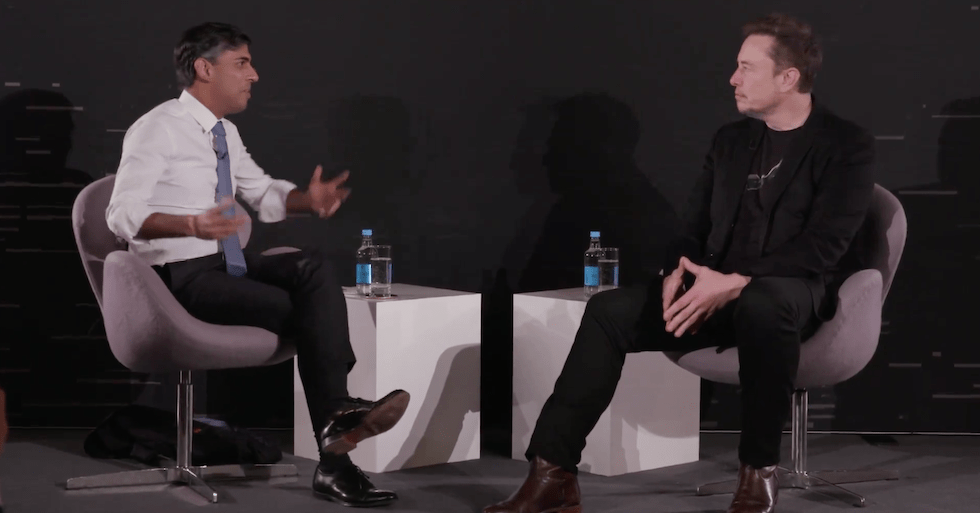Two of the world’s great unelected power-brokers met last night at Bletchley Park. Elon Musk and Rishi Sunak held a joint interview after the international conference about AI. Their topic was regulation.
‘What should a government like ours be doing?’ said the PM.
What an odd start. Why is the Prime Minister asking a foreign billionaire to pre-empt parliament by shaping our internal regulations for us? But Elon seems to get a free pass. He’s regarded as a disinterested operator who supports the powerless against the mighty. And his air of eccentric innocence is fortified by his appearance. He hadn’t bothered to shave. His jowls are rimmed with bum-fluff and he grins constantly like an excited schoolboy. No stylist gets anywhere near him. He wears a costume of dark shapeless cast-offs and he resembles an unemployed session-musician who lives under a bridge.
He told Rishi that regulation would not ‘crush innovation’ and he likened AI to a sports field. ‘We’ve learned that having a referee is a good thing.’ But ‘digital superintelligence’ is improving at the rate of ‘five times or ten times a year,’ he warned, ‘and government is not used to moving at that speed.’
Rishi asked if AI would affect the job market and he gave Elon a gentle steer by dealing with an imaginary question. ‘My answer,’ said Rishi, ‘is that AI is creating jobs. It’s a co-pilot. Not replacing the person but helping you do your job better.’
He resembles an unemployed session-musician who lives under a bridge
Elon disagreed, and he reeled off a list of dazzling forecasts. ‘We are seeing the most disruptive force in history… There will be an age of abundance’, he said. And this will lead ‘not to a universal basic income but to a universal high income.’ Soon enough, he predicted, ‘everyone will have access to this magic genie, and there will be a point where no job is needed and AI will be able to do everything.’ Once that happens, he mused, the only challenge faced by humans will be ‘how to find meaning in life.’
Rishi had to unscramble this cascade of prophecies. ‘A universal high income is a nice phrase,’ he said. And he repeated ‘an age of abundance,’ as if trying it out as a Tory re-election slogan. But Elon’s suggestion that the labour market would vanish alarmed him.
‘I think work is a good thing,’ said Rishi. ‘It gives people purpose.’ And he turned to the school system, perhaps hoping to save the careers of a few teachers.
‘My job is to create an incredible education system,’ he prompted. But Elon offered no encouragement here. He said that AI would shortly invent ‘the best and most patient tutor … a phenomenal tutor on any subject.’ This sounds like a mouth-watering prospect. A digital teacher that delivers lessons all day, every day, that doesn’t go on holiday, doesn’t sleep, doesn’t strike, doesn’t need lunch-breaks, wages or a pension, and doesn’t belong to a union. Surely the teaching profession is entering its death throes. But Rishi was in luck. Elon preferred not to explore the practicalities of automated tuition and instead he moved to another benefit of personalised AI: companionship. One of his sons dislikes making friends, he said, and he looks forward to providing the boy with a digital substitute.
Rishi opened the debate to the floor and the first questioner asked about the practicalities of AI. Elon seemed a bit stumped, so Rishi offered an example. He said that AI would speed up the sluggish processes of the gov.uk platform. As an example, he suggested that international travellers with lost documentation could get their paperwork replaced more quickly. Elon chipped in here. He said that AI would be ‘like having a very smart friend you can ask anything: how to make anything, how to solve any problem.’
This was highly revealing. Elon didn’t say that our ‘very smart friend’ would be able to deliver the end-product. Our friend will merely be able to describe how it might be done. But we already have Alexa to explain to us ‘how to make a biscuit,’ for example. What we need is the biscuit itself, delivered on a plate, fresh from the oven. The prospect of Alexa performing such mundane chores seems as remote as ever.
To some of us, this is no surprise. In the 1970s, the world was told that a new ‘magical genie’ would replace all manual jobs by the year 2000. This invention was called the ‘silicon chip’, and the experts spoke of its revolutionary potential in the same tones of wonder and apprehension that were used by Elon and Rishi yesterday. But the transformation didn’t materialise. Half a century later we still have the most elementary tasks (like vacuuming carpets or cleaning windows) being performed by humans not robots. Beneath the bluster, there’s little proof that manual labour is about to be effaced from the human experience.
Elon was asked about the threat to X (formerly Twitter) from fraudulent accounts. And he suddenly became animated and specific. ‘That could be an insurmountable problem next year,’ he said. He explained that it was pointless asking users ‘to identify traffic lights’ because bots have been trained to be ‘a better human than a human.’ His solution is to protect his business by charging users 43 cents each. ‘That makes it expensive if you have a billion bots. You run out of stolen credit cards pretty quickly.’
That was an astonishing admission. AI has failed to meet one of its very first challenges. Rather than neutralising bots with ‘digital superintelligence’, as he calls it, Elon will use fiscal muscle instead. And the money to will not be provided by him. We’re paying for it. Nothing new there either.







Comments